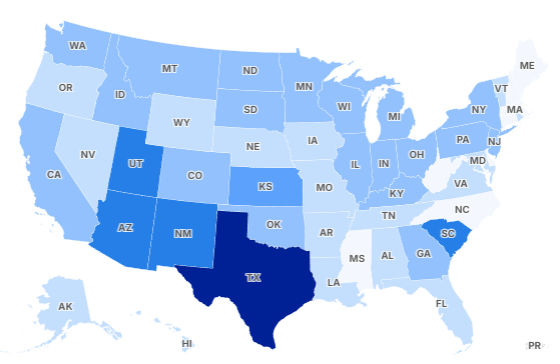New Legislation Aims to Crack Down on Financial Crimes by Public Officials
A new bill introduced in the U.S. Senate is raising eyebrows across Washington. Aimed at curbing financial fraud among elected officials, the proposed legislation is expected to trigger fierce debate in both political parties.
Senator John Cornyn (R-TX) introduced the bill on Tuesday, calling it a necessary step to ensure greater accountability for those in positions of public trust.
The proposed law, titled the Law Enforcement Tools to Interdict Troubling Investments in Abodes, or the LETITIA Act, is named after New York Attorney General Letitia James, who is currently under scrutiny in connection to allegations of mortgage fraud.
What Is the LETITIA Act?
According to the official summary, the LETITIA Act seeks to:
-
Establish mandatory minimum sentences for public officials convicted of financial fraud
-
Cover offenses related to bank loans, mortgages, and tax filings
-
Introduce enhanced penalties for repeat offenders who demonstrate a pattern of deception
Under the bill:
-
Bank or loan fraud convictions would carry a minimum of one year in prison
-
Tax fraud would result in a minimum of six months imprisonment
-
Repeat offenders could face up to five years behind bars
Why Now?
The bill arrives at a moment when trust in government institutions remains historically low. Multiple high-profile figures have come under fire for alleged personal financial misconduct—without consequence.
Among the names drawing attention:
-
Letitia James, reportedly under federal investigation for mortgage-related violations
-
Senator Adam Schiff (D-CA), accused by businessman Bill Pulte of falsifying documents to secure more favorable mortgage terms across state lines
No formal charges have been filed in either case, but the pressure is mounting.
The Message Behind the Bill
“This is about accountability,” Cornyn stated.
“Public officials should not be allowed to abuse their office for personal gain—and escape justice while ordinary Americans face the full force of the law.”
He added that the LETITIA Act is meant to eliminate double standards in how the law is enforced.
“This bill ensures public officials who commit fraud are held to the same standard as any other citizen,” Cornyn said.
A System That Protects the Powerful?
In recent years, Americans have watched as elected leaders have been implicated in financial scandals, only for investigations to quietly fade from public view.
Critics argue that selective enforcement and political favoritism have enabled some officials to act with near impunity.
The LETITIA Act is designed to close those gaps by giving federal prosecutors clear sentencing guidelines—and the authority to target fraudulent behavior tied to abuse of office.
Focus on Official Capacity Misuse
According to aides familiar with the bill, the language is carefully constructed to only apply to misconduct committed while holding public office or using that office for personal financial benefit.
This includes:
-
Submitting false loan documents
-
Misrepresenting primary residence status
-
Falsifying tax information to qualify for reduced rates or benefits
What About the Allegations Against Schiff?
In documents submitted to Congress, Bill Pulte claims Schiff used multiple addresses as primary residences to qualify for more favorable mortgage terms in multiple states—an act that, if proven, could violate both federal loan and tax regulations.
Schiff has not publicly responded, and no official charges have been announced.
Still, lawmakers say the pattern of concern is enough to require serious legislative action.
Support in the House?
Several Republican members of the House have expressed support for companion legislation.
Congressional sources suggest the House Judiciary Committee is already reviewing the text of the LETITIA Act and could propose a similar bill later this year.
If both chambers align, the legislation could represent one of the most aggressive ethics enforcement efforts in years.
Political Motives or Real Reform?
While the LETITIA Act has prompted accusations of political targeting, Cornyn insists it is a nonpartisan effort.
“The law should not treat members of Congress or attorneys general differently from the American people,” he said.
“This bill is about fairness and restoring confidence in public institutions.”
Whether the bill gains traction will depend on how both parties respond to the optics—and substance—of what could become a defining issue in the next election cycle.
So What’s Really Going On Here?
You’ve likely heard the names. You’ve seen the headlines. But the full scope of this legislation—and who it’s named after—might surprise you.
The LETITIA Act is named after a sitting attorney general and comes as new allegations surface against a high-profile senator.
And now?
Congress may be preparing to bring the hammer down.
https://twitter.com/NEWSMAX/status/1952698824486494508

Emily Johnson is a critically acclaimed essayist and novelist known for her thought-provoking works centered on feminism, women’s rights, and modern relationships. Born and raised in Portland, Oregon, Emily grew up with a deep love of books, often spending her afternoons at her local library. She went on to study literature and gender studies at UCLA, where she became deeply involved in activism and began publishing essays in campus journals. Her debut essay collection, Voices Unbound, struck a chord with readers nationwide for its fearless exploration of gender dynamics, identity, and the challenges faced by women in contemporary society. Emily later transitioned into fiction, writing novels that balance compelling storytelling with social commentary. Her protagonists are often strong, multidimensional women navigating love, ambition, and the struggles of everyday life, making her a favorite among readers who crave authentic, relatable narratives. Critics praise her ability to merge personal intimacy with universal themes. Off the page, Emily is an advocate for women in publishing, leading workshops that encourage young female writers to embrace their voices. She lives in Seattle with her partner and two rescue cats, where she continues to write, teach, and inspire a new generation of storytellers.









